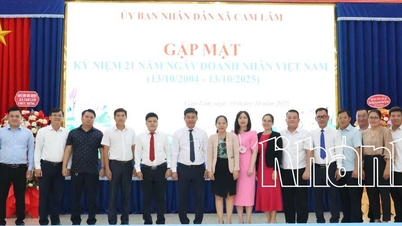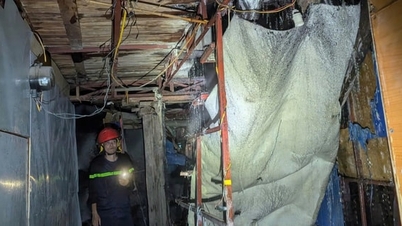Developing a comprehensive care model
The Provincial Psychiatric Hospital was established in 2000, is a grade II provincial hospital, with a scale of 150 beds. On average, the hospital treats about 150 - 170 inpatients per day and receives more than 70 outpatient visits.
 |
| Provincial Mental Hospital organizes recreational activities for patients. |
In recent years, in addition to inpatient treatment, the hospital has continuously innovated its treatment model in a comprehensive direction. The Department of Occupational Therapy was established, implementing 49 therapeutic activities to help mentally ill patients recover life skills, communication skills, social integration and occupational work. Since 2008, with the professional support of French and Taiwanese (China) experts, and domestic hospitals, the hospital has boldly expanded the field of child psychiatry, gradually meeting the needs of examination, assessment and intervention for children with mental developmental disorders. On average, each week, the hospital receives 9 children for examination and intervenes for about 10 children.
Dr. Nguyen Anh Chuong - Director of the Provincial Psychiatric Hospital said that since 2016, the hospital has advised the Department of Health to direct regional medical centers in the province to deploy psychiatric clinics at the grassroots level, helping patients to be examined and provided with outpatient treatment right in the locality using health insurance funds. Up to now, 100% of regional medical centers have maintained psychiatric clinics. At the same time, in the period of 2024 - 2025, the hospital organized a basic psychiatric training course for 58 doctors and medical staff (including 32 health station staff), contributing to enhancing the capacity to detect, manage and treat mental illness at the grassroots level.
Along with the above solutions, since 2018, the hospital has deployed a community-based intervention and rehabilitation model. Every month, a team of doctors, nurses, and therapy staff directly visit each family to guide intervention, monitor, and instruct family members in patient care and management. Thanks to that, many patients after intervention have maintained stability, taken care of themselves, participated in light labor, and reduced the rate of relapse and readmission. To date, the community-based intervention and rehabilitation model has been deployed at 86/129 commune and ward health stations across the province, bringing practical results.
In parallel with treatment, the hospital also focuses on communication to raise awareness about mental health. From 2022 to present, the hospital has coordinated with the Provincial Center for Disease Control and schools to organize more than 100 thematic talks, attracting 36,370 students to participate, helping them better understand stress, depression, anxiety, and how to take care of their mental health. From 2024 to present, the hospital has organized 50 communication sessions on caring for mentally ill people at health stations in communes and wards; at the same time, training and updating knowledge for specialized mental health staff of 129 communes and wards at least once a year. Professional inspection and supervision work is maintained regularly, contributing to improving the quality of mental health care at the facility.
Need community cooperation
According to Dr. Nguyen Anh Chuong, the above results were achieved thanks to the attention, direction, and support of authorities at all levels and the Department of Health in mental health care activities, especially localities creating conditions for mental patients to be examined and receive medicine at the facility; the medical staff in charge of the program have a high sense of responsibility.
However, at present, comprehensive mental health care at hospitals and in the community still faces many difficulties. There is a shortage of specialized psychiatric human resources, especially at the commune and ward levels - where most medical staff have not received specialized training in psychiatry. Limited financial resources make it difficult to communicate, train and maintain rehabilitation models in the community. In addition, social prejudice against mental illness still exists, affecting the detection, treatment and reintegration of patients. Specialized staff at the commune and ward levels often change, affecting the continuity of the program... Doctor Nguyen Anh Chuong said: "In the coming time, the hospital will continue to consolidate and expand intervention and rehabilitation models at all health stations; promote communication work in many diverse forms, integrated into union and school activities to reduce stigma; strengthen training of specialized psychiatric and psychological human resources for the grassroots level...".
With the synchronous implementation of mental health care models, the Mental Health Hospital has helped thousands of patients receive intervention and reintegration support; tens of thousands of students and people have been equipped with knowledge about mental health. However, for the program to continue to be effective, it requires attention from all levels, close coordination between sectors and especially the cooperation of the community.
World Mental Health Day is celebrated on October 10 every year, proposed by the World Mental Health Federation. The theme for 2025 is: “Access to Services - Mental Health in Disasters and Emergencies”. The goal is to educate and raise public awareness about the importance of good mental health.
Source: https://baokhanhhoa.vn/xa-hoi/y-te-suc-khoe/202510/huong-ung-ngay-suc-khoe-tam-than-the-gioi-10-10-quan-tamcham-soc-suc-khoe-tam-than-7e315ed/


![[Photo] Unique Phu Gia horse hat weaving craft](https://vphoto.vietnam.vn/thumb/1200x675/vietnam/resource/IMAGE/2025/10/10/1760084018320_ndo_br_01-jpg.webp)


![[Photo] Opening of the World Cultural Festival in Hanoi](https://vphoto.vietnam.vn/thumb/1200x675/vietnam/resource/IMAGE/2025/10/10/1760113426728_ndo_br_lehoi-khaimac-jpg.webp)
![[Photo] Ho Chi Minh City is brilliant with flags and flowers on the eve of the 1st Party Congress, term 2025-2030](https://vphoto.vietnam.vn/thumb/1200x675/vietnam/resource/IMAGE/2025/10/10/1760102923219_ndo_br_thiet-ke-chua-co-ten-43-png.webp)























































































Comment (0)